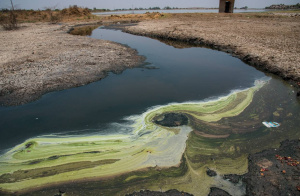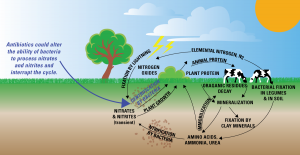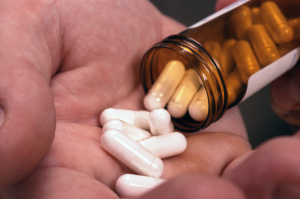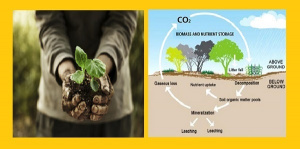When we think of Sustainability, does it cross our mind that the antibiotics and other pharmaceuticals that manufactures produce are hurting our environment as well as hurting our health? It is the topic that I will explore in this blog.
Where Do We Find Antibiotics In The Environment?
From a group called: reactgroup.org, we learn some startling facts. Antibiotics are used in aquaculture. They are put in animal feed for large-scale farming for disease protection and are used to fatten animals. As a result, we find parts of antibiotics in the feces and urine of animals. The problem is their manure, which now contains, as well as nutrients, is spread on crops as a fertilizer. What is this drug fertilizer doing? It is contaminating the environment with antibiotic residues and resistant bacteria. We find this now in river water and sediments.
The Situation In India
We learned that India is known as the world’s largest manufacturer of active substances for medicines. There is a treatment plant near Hyderabad that receives wastewater from approximately 90 pharmaceutical factories. The treated wastewater is then released into the Avari River. But is this water now pure? Let’s look at ciprofloxacin-a broad-spectrum antibiotic. Five times the amount that the entire country of Sweden uses in a day was found to be released by the Hyderabad wastewater plant in one day. This river is a water source for millions of Indians downstream.

When this downstream water was examined, this discharge water was discovered to be highly toxic to many organisms as well as containing pharmaceuticals at concentrations millions of times higher than those we usually detect and higher than what you would find in your blood when you ingest the medication. How has it polluted the environment? One gram per kilo of the sediments of the river is ciprofluoxetine. There is so much of it that it could be mined from the ground. If the river bed is contaminated, so is the water in the field.
The downstream poor villagers are thus drinking, cooking, bathing and irrigating their crops with water containing pharmaceuticals and antibiotics. And if they eat the fish from these waters, they are getting food contaminated with medicines and antibiotics. This is not good for their health. They have few alternative sources of water.
Living With Antibiotics In The Environment
If you want to talk about Sustainability, you have to address this water contamination problem. This problem becomes a world moral dilemma. Why, because the antibiotics in the environment can cause antibiotic-resistant bacteria which can spread worldwide. The World Health Organization says resistant antibiotic bacteria are one of the three most significant threats to public health. In emergencies, antibiotics do play an essential part in health care. Is there something we can do concerning medicines?

Effects Of Antibiotics On The Human Body

When you are talking about Sustainability, then you are concerned about the health of humanity and the human gut is the root of health. The human gut contains trillions of microorganism (microbes) which must work in harmony. They form the microbiome community. A healthy gut regulates the barrier between the intestines and bloodstream. This barrier allows nutrients to flow to organs and prevents pathogens from entering.
What is the job of these microbiomes?. The microbes ferment food releasing nutrients. What is produced in the gut: aromatic amino acids, enterobactin, folic acid, and it is here we make 70 to 80% of the neurotransmitters. What are the jobs of neurotransmitters? Neurotransmitters travel from the gut to the brain and affect the brain in function and our moods. Thus we have the microbiomes creating a Gut-brain communication. It is here in the stomach that serotonin known as the mood creator lives, where the immune system starts, where metabolism occurs, etc.
The gut is analogous to the roots of a tree. When a tree is sick, you look to the, and the same applies to the human body. Hippocrates said that “All disease starts in the gut.” When the microbiota is imbalanced, we experience
Inflammation that causes hyper-permeability of our intestinal lining. Why is hyperpermeability dangerous? Hyper-permeability allows irritants and toxins to be released into our bloodstream. These damage our cells and impair the function of our brain and other vital organs. Sourced from, “Twelve Ways to Repair the Gut”, Copyright 2018 by Capio Media Pty Ltd.
The “GUT”
What creates an imbalance in the microbiomes? I am sorry to say, and it is antibiotics. Antibiotics do not discriminate between beneficial and damaging microbes (bugs). All bugs are wiped out when you use antibiotics. Some diseases that occur when the microbiome is unhealthy can include: autoimmune disease, food, and seasonal allergies, immune deficiency, brain fog, inflammatory diseases, digestive disease, IBS, urinary infection, all skin issues, depression, anxiety, constipation, fatigue, diabetes, Alzheimer’s, cancer, hormone imbalance, and the list goes on. With so many antibiotics now in the water and land, it is no wonder chronic illness is on the rise. The above information came mainly from https://gutsolutionseries.com/episode1 and 3-live.
What Can We Do?

There are two significant things needed to create a sustainable environment in our own body that will affect the environment. Use antibiotics only in emergencies. I use the following first to maintain my own and my husband’s health:
- Fresh Neem leaves,
- Vitamin C
- Oxygen therapy
- rife technology,
- frequency medicines
- Ayurvedic, homeopathic,
- Colloidal silver
- Herbs
and most important a ceiling on desires when it comes to choosing the foods I allow in my home and my body, even when I am dining out. If we maintain our bodies without antibiotics, then when we need them, they will work. This will cut down on the number of medicines manufactured in the environment, thus stopping the creation of antibiotic resistance bacteria.
Glyphosate
Wait for a second, Roundup contains Glyphosate. I was surprised to learn that Glyphosate has been patented as an antibiotic. Why, because it kills bugs. That is why it is used on plants to kill the bugs attacking the plants. Glyphosate kills all of the beneficial microbes in the plant and bonds all the plants mineral ions in the plant and turns them into salts. When minerals like Calcium etc. are converted into salts, they become heavy metals (These are toxins). This means that that the crystal is no longer available for the plant body and it dries up and dies. If you are eating GMO (genetically modified organism), then you are getting glyphosates in your food.
This Glyphosate does the same thing to the minerals in your gut. The minerals now become heavy metals. And you become mineral deficient plus now the heavy metals toxins will play havoc on the brain and the rest of the body.
What can you do INSTEAD OF USING ROUND UP IN YOUR GARDEN? Here are a few suggestions:
- Practice Regenerative farming,
- Organic farming,
- Home farming,
- Zero budget natural farming.
- Use neem as a weed spray, try Bijamrita, or Jiwamrita.
Discourage farmers from planting GMO’s. And outlaw their production. If the food contains GMO’s, I refuse to buy it. My body is a temple for my Soul; I have great respect for that part of me. You can search the internal for other ways of farming.
Do we think about preservatives? Many of them are antibiotics. Therefore, they do the same thing in your body and also affect the environment. Better to not eat foods with preservatives.
Encourage manufacturers to use Vitamin C as a preservative. If you drink chlorinated or fluoridated water, it also harms your gut. Better to drink reverse osmosis water or distilled water. Source for the above information is: https://gutsolutionseries.com/episode1-live and others came from my use.
True Sustainability will occur when we realize what we do to the Earth. We also do to our bodies which are from the Earth. The ceiling on Desires must be applied to how we manage our life and the planet.


Thank you for sharing such good knowledge. It’s really intuitive and informative